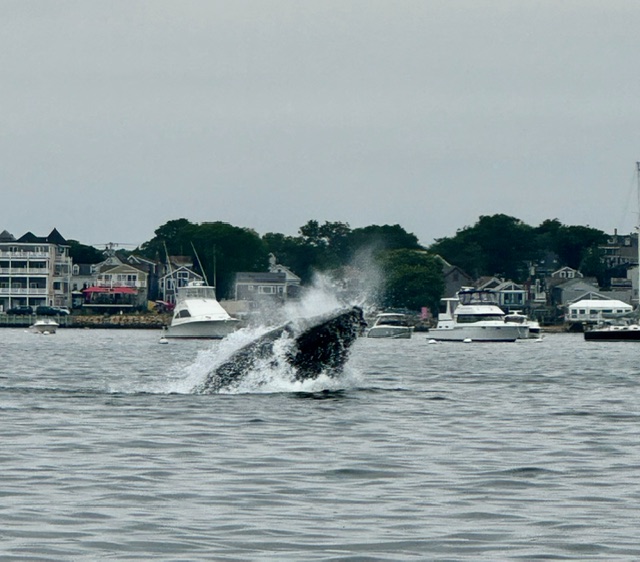This has been quite an interesting week on the waterfront. Pogies have invaded Provincetown Harbor by the thousands, and that usually attracts predators such as tuna, striped bass, and bluefish. But instead of those three species, it has attracted humpback whales. We have had at least one humpback in the harbor all week. One day it was even a cow-calf pair. Having them in the harbor is a double-edged sword.
I’m going to spare you my rant about needing to pass a road test to drive a car but no test at all to operate a boat, but this is the source of my worry. Whales have a hard time orienting to high-frequency motor sounds and the herky-jerky movements of small boats. They do much better with large, low-frequency big motor sounds and the slow, methodical movements that whale watch boats and their skilled captains practice.

To have whales in a somewhat confined space with a whole lot of small boats operated by people without a lot of skill is not a good situation. As exhibit A, let me refer you to the news of a couple of weeks ago from New Hampshire, where a boat operator got too close to feeding humpbacks and ended up colliding with a whale. His boat capsized and sank, though I hear it was recovered. There is no news on the condition of the whale.
I can assure you my apprehensiveness is justified. I could write a book about all the truly unbelievable things I have seen untrained and unskilled private boat operators do in my 50 years of party-boat fishing, commercial fishing, and whale watching. Are there responsible and skilled private small boat operators out there? Absolutely. But in the height of the summer season, I daresay they are outnumbered.
If you see a humpback whale in the harbor and are in a small recreational boat, keep your distance — that means a minimum of 500 feet. Move slowly and never ever put your boat on top of or anywhere near a greenish-looking patch of bubbles. A whale rising to the surface will soon lunge through that bubble cloud it has created to corral its intended food.
Fishing has been a bit slow this week, as striped bass have thinned out in our area. Even so, the place to catch them remains the same as it was when there were more fish here: Race Point to Head of the Meadow Beach. The weather has been incredibly changeable. We’ve had some beautiful days, but we cannot seem to string two of them together or even get two good trips in the course of one day.
Bluefish remain elusive, although we got a big charge of smaller bluefish a few days ago and we will see if they stay put and settle in or come and go the way the much larger fish that preceded them by a few weeks have done. We certainly have enough baitfish around to keep them interested.
Commercial bass season officially ended for the year with the 2024 quota being filled a little earlier than expected — last Tuesday. That fact tells me a lot of big fish were caught in Massachusetts during this commercial season, because the minimum size for commercial keepers is 35 inches. But I can tell you one thing: not that many of those big fish were caught in our neck of the woods.



